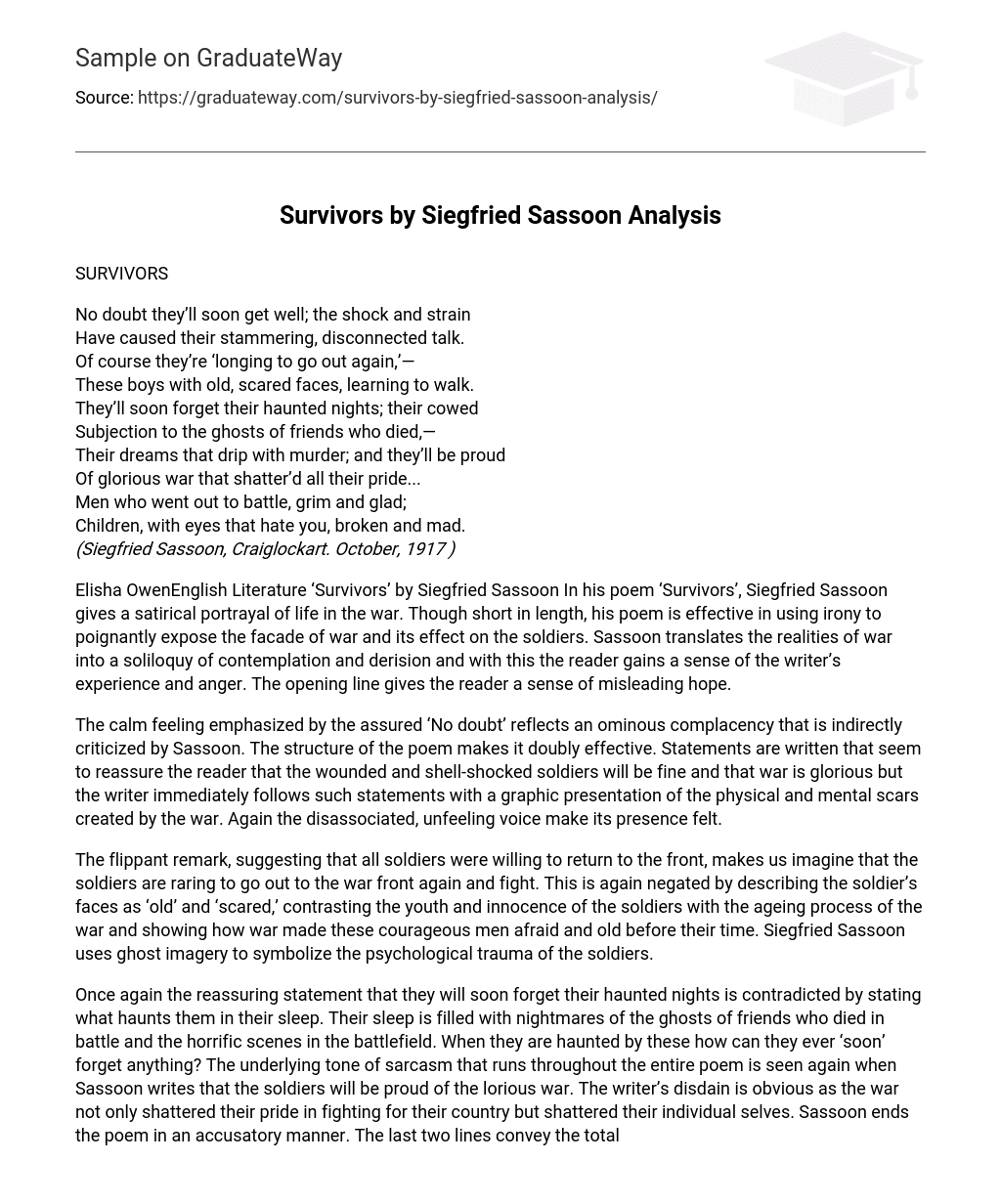SURVIVORS
No doubt they’ll soon get well; the shock and strain
Have caused their stammering, disconnected talk.
Of course they’re ‘longing to go out again,’—
These boys with old, scared faces, learning to walk.
They’ll soon forget their haunted nights; their cowed
Subjection to the ghosts of friends who died,—
Their dreams that drip with murder; and they’ll be proud
Of glorious war that shatter’d all their pride…
Men who went out to battle, grim and glad;
Children, with eyes that hate you, broken and mad.
(Siegfried Sassoon, Craiglockart. October, 1917 )
Elisha OwenEnglish Literature ‘Survivors’ by Siegfried Sassoon In his poem ‘Survivors’, Siegfried Sassoon gives a satirical portrayal of life in the war. Though short in length, his poem is effective in using irony to poignantly expose the facade of war and its effect on the soldiers. Sassoon translates the realities of war into a soliloquy of contemplation and derision and with this the reader gains a sense of the writer’s experience and anger. The opening line gives the reader a sense of misleading hope.
The calm feeling emphasized by the assured ‘No doubt’ reflects an ominous complacency that is indirectly criticized by Sassoon. The structure of the poem makes it doubly effective. Statements are written that seem to reassure the reader that the wounded and shell-shocked soldiers will be fine and that war is glorious but the writer immediately follows such statements with a graphic presentation of the physical and mental scars created by the war. Again the disassociated, unfeeling voice make its presence felt.
The flippant remark, suggesting that all soldiers were willing to return to the front, makes us imagine that the soldiers are raring to go out to the war front again and fight. This is again negated by describing the soldier’s faces as ‘old’ and ‘scared,’ contrasting the youth and innocence of the soldiers with the ageing process of the war and showing how war made these courageous men afraid and old before their time. Siegfried Sassoon uses ghost imagery to symbolize the psychological trauma of the soldiers.
Once again the reassuring statement that they will soon forget their haunted nights is contradicted by stating what haunts them in their sleep. Their sleep is filled with nightmares of the ghosts of friends who died in battle and the horrific scenes in the battlefield. When they are haunted by these how can they ever ‘soon’ forget anything? The underlying tone of sarcasm that runs throughout the entire poem is seen again when Sassoon writes that the soldiers will be proud of the lorious war. The writer’s disdain is obvious as the war not only shattered their pride in fighting for their country but shattered their individual selves. Sassoon ends the poem in an accusatory manner. The last two lines convey the total effect of the war; reducing men who went to war, glad to be serving their country, to the level of helpless children. The hate he talks about referring to the people who supported the war even though they could never understand its horror. Survivors’ juxtaposes hope and the harsh brutality of battle in an exploration of the brokenness of the soldiers and the unfeigned optimism of those who didn’t even go to war. Its sad rhetoric displays the lack of understanding and the alienation that so many soldiers felt. Siegfried Sassoon uses vivid language and description to capture the essence of despair. The poet’s stance on the matter is seemingly neutral but there is a subliminal message of cynicism and confrontation with a society that sent its men to a war they could never be prepared for.
Summary Of Survivors By Siegfried Sassoon
The poem explanation could sound confusing for those people who are not connected with the war in any way. However, those who lived through the horrible war realities will find these lines close and penetrative. The poet pictures the effects that the battles left in fighters’ life the results that are not easy to be eliminated. He was trying to give an indirect criticism of the people’s contented attitude to the warfare. He puts the ironic tone to show how absurdly praises for the battle sound if one compares it with the soldier’s sufferings. Even when they are in safe and return to their families, they couldn’t be calm and happy. They should always fight with the army of their memories and emotions that will not go after the end of the terrible time. The poet tried to say that although people praise the soldiers and give them thanks, they could never understand how awful it is to have the battle inside you.
In order to sound clearer and more appealing, the author used a variety of poetic devices. One can find the examples of personification: “Eyes that hate you,” metaphor: “boys with scared old faces,” alliteration: “grim and glad,” and irony.





